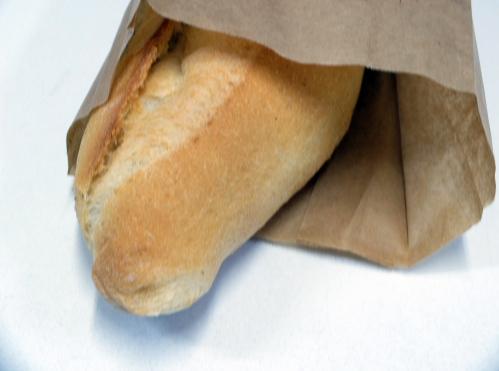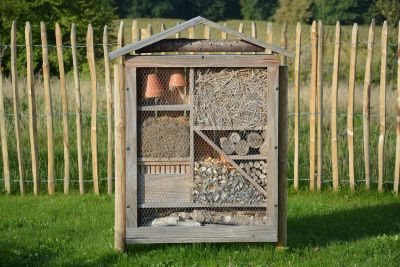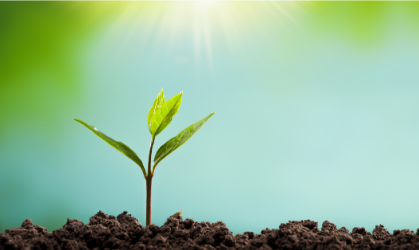Hello, I’m Ömer. I’m going to share a memory with you:
I have a sister named Ayşe. She’s very emotional; she cries at almost everything and believes in everything. She even believes in our grandmother when she says, “Don’t leave a single bread crumb behind, or they’ll cry after you.”
“Brother, you should eat too so they won’t cry!” I say, and she replies, “Alright, alright.”
One evening, I was studying in my room. I had played a match in physical education class that day, and I was very tired. I noticed the door creaking open, and when I looked, I saw some entities that resembled cotton balls entering. Upon closer inspection, I realized that these were bread crumbs, big and small, and they were all crying. I couldn’t believe my eyes. I looked again. Yes, these were bread crumbs, and they were crying. But there was no end to the ones coming in. Each one that entered found a place and continued crying. There was no space left in the room. My desk, my bed, everything was filled.
“Who are you, and what do you want?” I asked. I wish I hadn’t asked. Voices came from every direction: “I’m the bread you didn’t eat at breakfast, I’m the bread crumbs you threw away after dinner, I’m the leftover sandwich bread you left in the cafeteria…”
“Enough, why are you crying?” I said. The biggest one among them must have been their spokesperson; he stepped forward and began to speak. I recognized him. He was the quarter of a bread loaf that my mom had put in my lunchbox, and I had forgotten and later threw it away.
“We are sorry, that’s why we’re crying. We are prepared with great effort, but we are wasted and thrown away. We don’t want to go to waste; we want to be useful to people. We are happy when they eat us because we fulfill our duty.”
“What effort are you talking about?” I asked.
The quarter of a bread loaf replied, “Let me tell you our story. We are an essential part of all meals. Our story is long. First, the land is prepared for wheat cultivation. The remaining roots from the previous harvest are removed. A bed is prepared for the seeds; the soil is tilled with a plow. When the season comes, seeds are sown with prayers. Then it is fertilized and watered. Harvesters enter the field when it’s time to harvest. The harvested wheat is transported to the granaries, cleaned, and dried. Then it’s time to go to the mill. The ground wheat is sifted to separate flour and bran. Now it’s time to go to the bakery. The flour is kneaded into dough, fermented, and then placed in the oven to bake. The bread, as brown as berry, is ready to come to the table. After all this, you go to the store and buy the bread.”
“Wow, I never thought about it like that. I always thought bread was cheap, and a little waste wouldn’t hurt,” I said. Meanwhile, I felt some movement on my shoulder. I thought those who couldn’t find a place had climbed on me. But it was my dad touching my shoulder.
“Ömer, my boy, you must have fallen asleep. You had physical education class again today, didn’t you?” he said, addressing me.
I told my dad about the dream. He laughed a lot.
“So, you talked to a quarter of bread loaf, huh! The kid is right. There is effort and hard work at every stage before bread comes to our table. Of course, it’s not just bread; similar things are done for many foods. We shouldn’t waste and should show respect to the blessings given by our Lord,” he said. When I asked how to show this respect, he said, “If we don’t waste food, don’t throw it away, and even if it becomes stale, find different ways to use it, and if we give excess to the poor, then we will have shown respect. In our Holy Book, it is stated, ‘Eat and drink, but do not be wasteful (by over-eating or consuming in unnecessary ways): indeed, He does not love the wasteful.’ (Qur’an 7:31).”
“But we have a lot of money. What’s the harm if a little goes to waste?” I asked.
“My son, even rich people should not waste. We can’t say, ‘I paid for it, so I can use it as I please.’ Having a lot of money doesn’t justify wasting it. Even when taking ablution from a river, the Prophet Muhammad (peace be upon him) recommended not wasting water. And when there are so many people in the world suffering from hunger, it’s not right to waste, is it?” he said.
“What do you mean, are there people who can’t find bread?” I asked.
“Yes, my son. According to what I’ve read, about 25,000 people die every day in the world due to inadequate nutrition.[1] In our country (Turkey), about five million loaves of bread are wasted every day.”[2]
I had learned so much about wasting from my father. I promised not to waste food again and got his word not to tell my sister about the dream. The next day, I didn’t leave any extra bread at breakfast and collected all the crumbs. My grandmother, who saw this, said with a smile, “Well done, my boy. Put a quarter of a bread loaf in your lunchbox; you can chat along the way.”
I turned to my father and said, “I didn’t tell my sister, Dad.”
[1] www.un.org/en/chronicle/article/losing-25000-hunger-every-day
[2] www.israf.org/sayfa/Korkunc-rakam-Gunde-5-milyon-ekmek-cope-gidiyor/591




